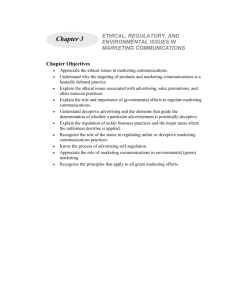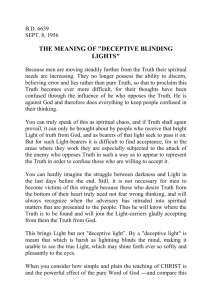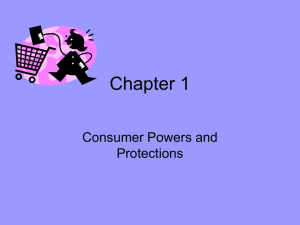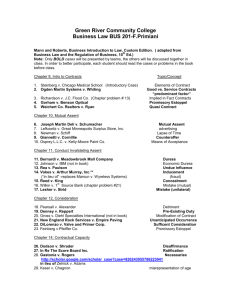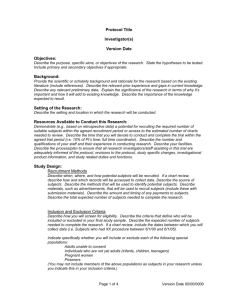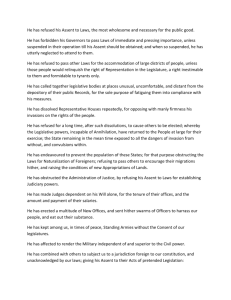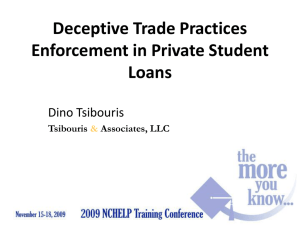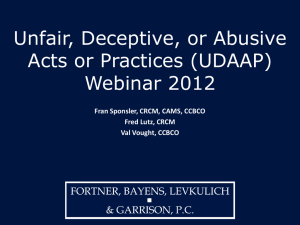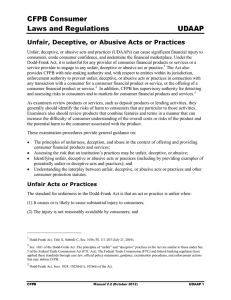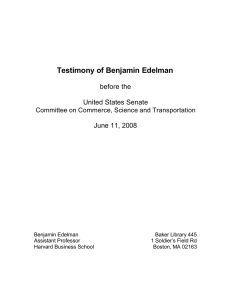Contracting Spyware by Contract?
advertisement
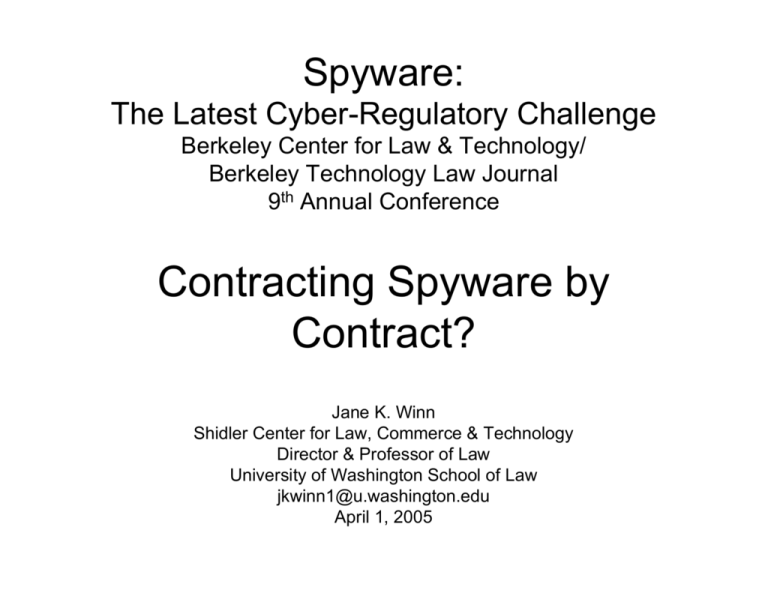
Spyware: The Latest Cyber-Regulatory Challenge Berkeley Center for Law & Technology/ Berkeley Technology Law Journal 9th Annual Conference Contracting Spyware by Contract? Jane K. Winn Shidler Center for Law, Commerce & Technology Director & Professor of Law University of Washington School of Law jkwinn1@u.washington.edu April 1, 2005 Contracting Spyware by Contract? • Locate product along spectrum: Malware, Spyware, Adware, Sponsorware, others? • US contract law contract formation requirements relaxed to facilitate adoption of new market channels • Deceptive clickwrap interface is a deceptive trade practice, but is enforcement effort adequate? • Contrast Bono Bill “Notice & Consent” standard with EU Unfair Contract Terms law: reproducing dysfunction of US information privacy law in US contract law? Spectrum of “Wares” • Malware: already prohibited by computer crime laws – ECPA, CFAA, state laws • Spyware: software that gathers and transmits information without end user’s knowledge or consent is deceptive and prohibited as fraud or deceptive trade practice • Adware: one-to-one marketing that is perceived as invasive or annoying by end user but that is covered by license • Sponsorware: business model trades access to proprietary content in return for one-to-one marketing that is accepted by end user Has a Contract Been Formed? • • Whether assent to contract has been manifested is fact specific inquiry Restatement (Second) of Contracts § 19, Conduct as Manifestation of Assent, provides: – the manifestation of assent by written or spoken words or by other acts or by failure to act; – No assent unless intentional conduct or reason to know conduct will be treated as assent by other party; and – If no assent, then contract may be voidable for fraud, duress, mistake or other invalidating cause • • Pay Now, Terms Later and Shrinkwrap binding unless result is unconscionable Clickwrap is binding unless result is unconscionable – 12 or more cases 1998-2004 say yes; 3 say no and margin is growing.. • But how can a contract be formed with “browsewrap”? – – – – – No - Ticketmaster Corporation v. Tickets.com, 2000 U.S. Dist. LEXIS 4533 No - Specht v. Netscape, 306 F.3d 17 (2nd Cir. 2002) Maybe - Pollstar v. Gigmania, 170 F. Supp. 2d 974 (E.D. Cal. 2000) Yes - Register.com, Inc. v. Verio, Inc., 126 F.Supp 2d 238 (S.D.N.Y. 2000) Maybe - Ticketmaster Corp. v. Tickets.com, 2003 U.S. Dist. LEXIS 6483 Why So Little Scrutiny? • If it looks like a duck, walks like a duck, sounds like a duck, then it is a duck unless it is unmistakably a carnivorous predator • Background assumptions about consumer preferences regarding marketing and risk – Are new marketing channels on balance desirable? – John D. Rockefeller: “I cheat my boys every chance I get, I want to make 'em sharp. I trade with the boys and skin 'em and I just beat 'em every time I can. I want to make 'em sharp...” • Is it an inevitable part of a market economy to apply so little scrutiny to contract formation and terms? Fraud Is Not Contract, But… • Fraud: Was reliance on false statement reasonable? What detriment was suffered? • Federal Deceptive Trade Practices Law – Misleading in context can be deceptive even if technically not false – No private right of action • State Deceptive Trade Practices Law – Similar standards for deceptive – Private causes of action – Jurisdictional issues; judgment proof defendants Bono Bill “Notice & Consent” • Application to adware & sponsorware: – Unlawful to collect personally identifiable information without “notice & consent” – Does not apply if information collected if not personally identifiable • Sectoral approach to contract law reform? – If it “really matters” then strict regulation, otherwise primordial struggle? – Is limited regulation of consumer standard form contracting feasible? • But is notice & consent working in information privacy law? – Another example of disclosure bias in US law? – What about regulation of substance? Deny Enforcement to Unfair Contract Terms • 1994 Directive &1997 Member state Law -- If contract formed: – Using standard form prepared by merchant in advance – Offered to consumer on a take it or leave it basis • Then review substantive fairness of terms; deny enforcement to any term that is unfair • Appendix provides non-exclusive list of examples; database provides access to 10,000 cases • Is this term in this context unfair? – Mandatory predispute arbitration agreements – Electronic funds transfer based on account number not name – Terms may change in future at merchant’s discretion – Delivery should be within 4 days but no recourse unless more than 30 days Conclusion • Assume some consumers willing to surrender personal information in return for access to something valued • Can current US law contract law adequately police terms of that trade? • Would legislation like Bono Bill adequately police terms of that trade? • Is this yet another indication that the current trend in US contract law is cause for concern?
